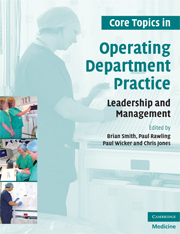Book contents
- Frontmatter
- Contents
- List of contributors
- Foreword
- Preface
- 1 Managing change in perioperative education
- 2 The role of the operating department manager within the context of the organization
- 3 Action learning: a new way of problem solving in perioperative settings
- 4 Agenda for change: what do theatre staff need to know?
- 5 The SWOT analysis: its place in strategic planning in a modern operating department
- 6 Corporate governance: setting the scene for perioperative practice
- 7 Managing different cultures: adversity and diversity in the perioperative environment
- 8 Leadership in perioperative settings: a practical guide
- 9 Management and leadership of advanced practice
- 10 Managing conflict in perioperative settings
- 11 The management and organization of emergency operating lists
- 12 Organizational culture
- 13 Development matters in the NHS; including a perioperative approach to the KSF
- 14 Equipment procurement: a purchaser's guide for theatre managers
- 15 The reflective practitioner in perioperative settings
- 16 New ways of working in perioperative practice
- 17 Damned if you do and damned if you don't: whistle blowing in perioperative practice
- 18 A manager's experience of recruitment and retention
- 19 The management of change
- Index
- References
17 - Damned if you do and damned if you don't: whistle blowing in perioperative practice
- Frontmatter
- Contents
- List of contributors
- Foreword
- Preface
- 1 Managing change in perioperative education
- 2 The role of the operating department manager within the context of the organization
- 3 Action learning: a new way of problem solving in perioperative settings
- 4 Agenda for change: what do theatre staff need to know?
- 5 The SWOT analysis: its place in strategic planning in a modern operating department
- 6 Corporate governance: setting the scene for perioperative practice
- 7 Managing different cultures: adversity and diversity in the perioperative environment
- 8 Leadership in perioperative settings: a practical guide
- 9 Management and leadership of advanced practice
- 10 Managing conflict in perioperative settings
- 11 The management and organization of emergency operating lists
- 12 Organizational culture
- 13 Development matters in the NHS; including a perioperative approach to the KSF
- 14 Equipment procurement: a purchaser's guide for theatre managers
- 15 The reflective practitioner in perioperative settings
- 16 New ways of working in perioperative practice
- 17 Damned if you do and damned if you don't: whistle blowing in perioperative practice
- 18 A manager's experience of recruitment and retention
- 19 The management of change
- Index
- References
Summary
Key Learning Points
Understand the moral aspects of whistle blowing
Identify the consequences of whistle blowing
Introduction
There can be few perioperative practitioners who do not prefer the work of some surgeons to that of others. Some surgeons make the work look easy. They are calm under pressure. They use the minimum amount of equipment. Other surgeons just seem to have ‘an unusual amount of bad luck’. But for the operating department practitioner or nurse who witnesses this phenomenon, there will be a question that will occur again and again: ‘How much poor practice could I stand to watch before I spoke out and said something?’
Dilemmas over what should be spoken about in public and the best way to communicate dissatisfaction with standards at work are deep and complex. At one extreme, simply voicing concerns at work will be enough to rectify an unfortunate situation. At the other extreme, no amount of ‘going through the appropriate channels’ will be enough to correct even gross lapses in standards. In these circumstances, the employee has to face the prospect of drawing attention to the situation in the most difficult way possible, by whistle blowing (Shah 2005).
- Type
- Chapter
- Information
- Core Topics in Operating Department PracticeLeadership and Management, pp. 146 - 152Publisher: Cambridge University PressPrint publication year: 2009



